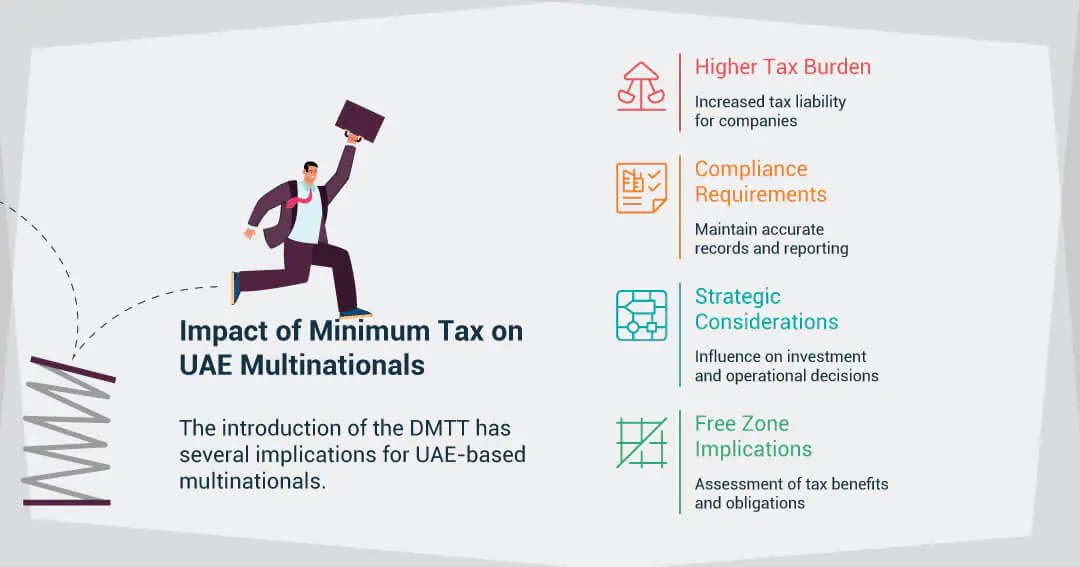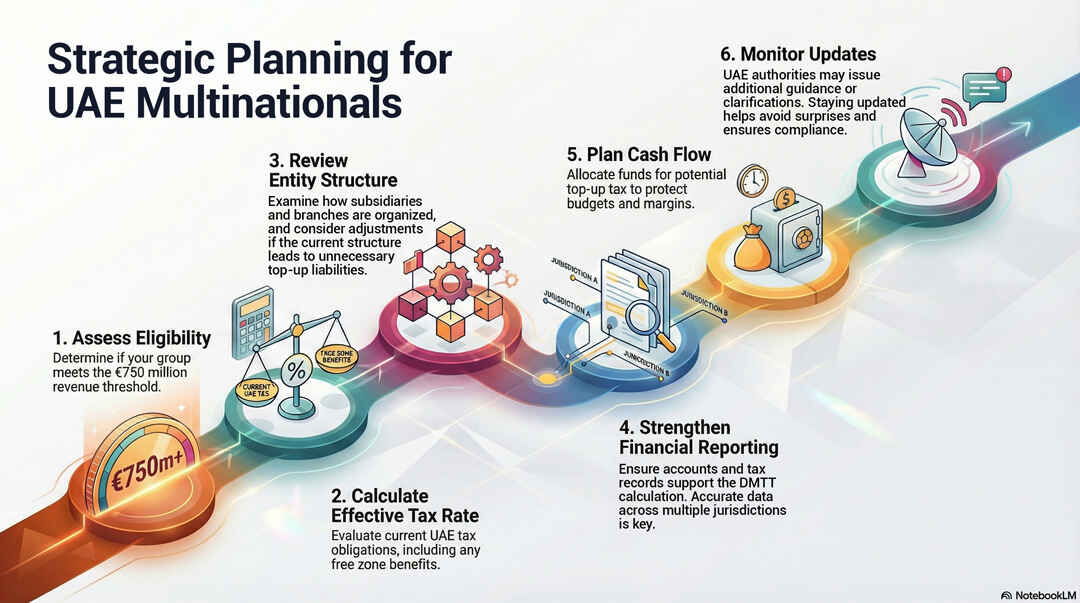Taxation has always shaped how multinational businesses operate. For decades, companies chose low-tax jurisdictions to optimize costs and stay competitive. The landscape is now shifting with the introduction of the global minimum tax UAE, part of the wider initiative led by the Organisation for Economic Co-operation and Development (OECD) under its Base Erosion and Profit Shifting (BEPS) project. The UAE, known for its business-friendly tax regime, has aligned with this framework to stay consistent with international standards.
This move has important consequences for UAE-based multinationals, particularly those with significant cross-border revenues. The big question is how the global minimum tax UAE changes the playing field for companies that have long relied on favorable tax conditions. Well, let’s discuss them in the blog ‘Global Minimum Tax UAE & its Impact on UAE Multinationals’.
Table of Contents
What Is the New Minimum Top-Up Tax in the UAE
In late 2024, the UAE implemented Cabinet Decision No. 142 of 2024, introducing a Domestic Minimum Top-Up Tax (DMTT). This measure is the UAE’s response to the OECD Pillar Two UAE rules under the Base Erosion and Profit Shifting (BEPS) project.
In simple words, the new law ensures that multinational enterprises (MNEs) operating in the UAE pay at least 15% effective tax on profits within the country. If the local corporate tax or free zone incentives result in a lower rate, companies must pay a top-up tax to reach the 15% threshold. The rules apply from fiscal years starting 1 January 2025.
The DMTT aligns the UAE with international standards and ensures that large multinationals cannot avoid minimum taxation by structuring profits in low-tax jurisdictions.
Also Read: Digital Transformation in Audit: Blockchain, Data Analytics, Real-Time Reporting
Background: OECD BEPS Pillar Two Explained
The global minimum tax UAE originates from the OECD’s BEPS (Base Erosion and Profit Shifting) initiative. Pillar Two is specifically aimed at introducing a coordinated system where large multinationals with annual consolidated revenues exceeding EUR 750 million have to pay a 15 percent effective tax rate. The idea is simple: no matter where profits are booked, they should not escape taxation below this threshold.
For years, countries competed on tax incentives to attract foreign investment. This created an uneven playing field, as large groups could exploit low-tax jurisdictions. Pillar Two curbs this by allowing jurisdictions to impose a domestic minimum tax, which ensures that the revenue stays within the country rather than being taxed elsewhere through top-up mechanisms.
Also Read: Transfer Pricing: What It Is, How It Works, and Real Business Examples
Who Is Affected? Global Revenue Thresholds for UAE Tax
Not every company in the UAE will be affected by the new minimum tax. The law applies only to multinational groups that meet certain size criteria.
- To qualify, a group must have consolidated annual revenues of at least €750 million in at least two of the last four fiscal years.
- The revenue test considers the Ultimate Parent Entity (UPE) of the multinational group. This means the financials of the entire group, not just the UAE entity, determine whether the rules apply.
What this really means is that small or mid-sized businesses are largely unaffected. The focus is on large corporations with cross-border operations, which could see additional tax obligations in the UAE.
Also Read: Ultimate Beneficial Owner (UBO) Verification: The Complete Guide
How the Minimum Tax Works
The DMTT functions as a top-up. Let’s understand it with a simplified example:
- If a UAE subsidiary pays UAE corporate tax at a rate of 9% due to free zone incentives, and the 15% minimum tax applies, the company will need to pay an additional 6% as top-up tax.
- If the effective rate is already 15% or higher, no additional payment is required.
The computation considers all taxable profits of the UAE entity within the multinational group. The law includes guidance on excluding certain items, such as investment entities or sovereign wealth funds, under specific conditions.
Also Read: UAE Announces Tax Update 2025: Key Changes Businesses Must Know
Global Revenue Thresholds for UAE Tax
The legislation clearly defines which companies fall within scope. The threshold of EUR 750 million (or its equivalent in dirhams) applies based on consolidated group revenues reported in the ultimate parent entity’s financial statements. Only those groups that cross this threshold for at least two of the four preceding fiscal years will be subject to the domestic minimum tax in the UAE.
This design ensures that compliance is targeted at the largest players while keeping smaller and medium-sized enterprises outside the framework. For UAE-based holding structures, this means careful monitoring of global revenues and consolidated accounts is now essential.
Also Read: How to Claim a VAT Refund in the UAE: Step-by-Step Guide 2025
Impact of Minimum Tax on UAE Multinationals

The introduction of the DMTT has several implications for UAE-based multinationals.
1. Higher Tax Burden
Companies that previously relied on free zone exemptions or low corporate tax rates may now face additional liability. Even if profits remain in the UAE, the top-up ensures that the effective rate does not fall below 15%.
2. Compliance and Reporting Requirements
Multinationals must maintain accurate records and report their tax position under the new rules. This includes:
- Collecting data across all jurisdictions in which the group operates.
- Calculating effective tax rates.
- Filing reports to UAE authorities.
The compliance process can be resource-intensive, especially for companies with complex global structures.
3. Strategic Considerations
The minimum tax may influence corporate decisions such as:
- Structuring investments across jurisdictions.
- Determining the location of intellectual property or financing entities.
- Evaluating free zone participation versus mainland operations.
What this really means is that tax planning in the UAE must now consider global revenue and tax structures, not just local incentives.
Also Read: What Are the Different Types of Audit Reports?
4. Implications for Free Zone Entities
Free zone companies with preferential tax rates will need to assess whether these benefits trigger a top-up obligation. Even zero-percent corporate tax in a free zone may not shield a company if the overall group’s effective rate is below 15%.
Industry-Specific Impact on UAE Multinationals
The 15 percent minimum tax will affect industries differently. Some examples include:
- Energy and Natural Resources
Operate through joint ventures and cross-border projects.
Tracking effective tax rates across multiple jurisdictions can be complex.
- Technology and Digital Services
Previously relied on intellectual property structures and royalties to reduce tax.
These models may now trigger top-up obligations.
- Logistics and Aviation
The UAE’s role as a hub means global operators may be in scope.
Effective tax rate monitoring becomes crucial due to varying margins.
- Financial Services
Already subject to strict regulations.
Will still need to align reporting systems with Pillar Two requirements.
The key takeaway is that each sector faces unique challenges, so UAE multinationals must approach the global minimum tax with well-planned, industry-specific strategies.
Also Read: How To Choose The Best Audit Firms in Dubai – UAE
Key Rules and Exceptions
The law provides certain exemptions and clarifications:
- Investment entities may be excluded under specific conditions.
- Sovereign wealth funds are generally outside the scope if they qualify as governmental entities.
- Certain joint ventures or special-purpose entities may be treated as separate groups for reporting purposes.
These rules aim to prevent loopholes while avoiding excessive compliance for smaller or public-sector entities.
Also Read: Documents Required for VAT Registration UAE
Strategic Planning for UAE Multinationals

For large groups, preparing for the DMTT is critical. Recommended steps include:
1. Assess Eligibility
Determine if the group meets the €750 million revenue threshold.
2. Calculate Effective Tax Rate
Evaluate current UAE tax obligations, including free zone benefits.
3. Review Entity Structure
Examine how subsidiaries and branches are organized, and consider adjustments if the current structure leads to unnecessary top-up liabilities.
4. Strengthen Financial Reporting
Ensure accounts and tax records support the DMTT calculation. Accurate data across multiple jurisdictions is key.
5. Plan Cash Flow
Allocate funds for potential top-up tax. Unexpected liabilities can impact budgeting and profit margins.
6. Monitor Updates
UAE authorities may issue additional guidance or clarifications. Staying updated helps avoid surprises and ensures compliance.
Also Read: The Three Golden Rules of Accounting
Broader Implications
The global minimum tax UAE reflects an international shift towards standardized taxation for multinational enterprises. For businesses in the UAE, this means:
- Fewer opportunities to rely solely on low-tax incentives.
- Increased transparency and reporting expectations.
- Strategic tax planning becoming a core element of corporate decision-making.
In practical terms, the change is not just about paying more tax; it also signals that the UAE is aligning with OECD UAE standards. This alignment could improve investor confidence and strengthen the UAE’s position as a hub for international business.
Also Read: Business Setup in Dubai: The Ultimate Guide to Company Formation in UAE
Compliance and Reporting Challenges for UAE Multinationals
The implementation of the global minimum tax UAE reshapes how multinationals manage compliance and reporting. While the initiative strengthens global tax fairness, it also creates practical challenges for companies that now need to rethink their tax governance models. Here are some of the key hurdles:
- Complexity of the rules
The OECD Pillar Two UAE framework is highly detailed, covering aspects such as income inclusion, undertaxed payments, and a lot more. For UAE multinationals, understanding how these rules interact with the domestic minimum top-up tax and the corporate tax regime requires significant effort.
- Heavy data requirements
Multinationals are now required to collect and reconcile data from different jurisdictions, subsidiaries, and business units. Inconsistent accounting practices or decentralized systems can make this process slow and prone to mistakes.
- Technology and system upgrades
Many companies will find their existing reporting tools inadequate for the level of detail now required. Investing in upgraded ERP systems, tax reporting software, and digital compliance platforms has become essential.
- Risk of penalties and reputation issues
Inaccurate or late reporting can attract financial penalties and trigger audits. Beyond that, reputational damage is a real concern. With global attention on how jurisdictions like the UAE are adapting to international tax reforms, transparency and compliance have become closely tied to corporate credibility.
- Shortage of skilled professionals
The global minimum tax is still a new concept in the region, and tax teams in the UAE may lack prior experience in managing such complex reporting requirements. This shortage of expertise often forces businesses to either invest heavily in training or rely on external advisors.
- Challenges of cross-border alignment
UAE multinationals typically operate across several countries, each with its own reporting expectations. Aligning compliance frameworks across jurisdictions while maintaining consistency with the UAE’s domestic top-up tax rules creates another layer of difficulty.
To conclude, the global minimum tax UAE marks a significant development for multinationals operating in the Emirates. Companies with large global revenues must now consider both their local and global tax positions to comply with the 15% minimum effective rate.
What this really means is that tax planning and compliance are more important than ever. Large UAE multinationals should review their structures, prepare for additional reporting, and forecast potential tax liabilities. Staying informed and proactive will ensure compliance and reduce unexpected financial risks.
Also Read: How to Find TRN Number and Perform TRN Verification in UAE?
Stay Ahead with Kreston Menon
With the experts of Kreston Menon, you can easily stay updated in the business scenario of Dubai. Our team helps UAE multinationals navigate complex tax rules and maintain compliance while planning for growth.
Also Read: What is ICV Certificate in Dubai-UAE and How to Get It?

